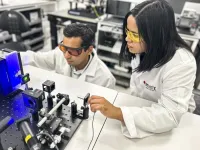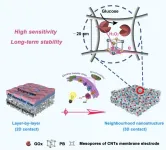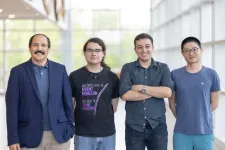(Press-News.org) June 14, 2023, TORONTO — Funding announced today by the Ontario Institute for Cancer Research (OICR) will help six Ontario-based research teams pursue their ultimate goal of improving the lives of people with cancer.
Funding comes through OICR’s Innovation to Implementation (I2I) program, which aims to help ensure new discoveries about preventing, diagnosing and treating cancer are adopted into healthcare policy and clinical practice.
“Every cancer researcher wants their work to have an impact on patients, but there are a lot of challenges that must be overcome before a promising idea in the lab can have a meaningful impact in the clinic,” says Dr. Christine Williams, OICR’s Executive Vice President and Head of Implementation Science. “That’s why OICR is proud to support these talented Ontario researchers bring potentially life-changing innovations to the people who need them.”
“It’s very exciting to see OICR fund these projects,” says Carol Gordon, a member of OICR’s Patient and Family Advisory Council who helped review I2I applications. “They all address important topics from a patient’s perspective, including personalized medicine, accessible genetic testing, quality of life and patient engagement.”
First launched in 2022, I2I awards support the uptake of new cancer tools and knowledge for the benefit of cancer patients. The awards are part of OICR’s Implementation Science program, which emphasizes ways to assess, test and implement research discoveries into Ontario’s healthcare system.
“The Ontario government is committed to advancing new discoveries in cancer research by supporting entrepreneurs who have developed innovative technologies, treatments and tools to help cancer patients,” said Jill Dunlop, Minister of Colleges and Universities. “These six projects all have the potential to improve cancer patients’ lives, by providing personalized care and treatments, and by making genetic testing faster and more accessible to all Ontarians.”
The six research projects funded as part of the 2023 I2I awards will receive up to a total of $200,000 each over the next two years. They include investigations into new tools to diagnose cancer, new approaches to evaluate emerging cancer technologies and ways to ensure all communities have access to new discoveries.
Dr. David Berman of Queen’s University created a system to objectively grade bladder cancer so that it can be treated more effectively. ‘High-grade’ and ‘low-grade’ bladder cancers are treated very differently, but the process to determine grading is highly subjective. Expert pathologists will disagree on cancer grades in 20 to 40 per cent of cases. With I2I funding, Berman and colleagues will test a computer-aided grading system for bladder cancer based on quantitative measures and work with industry, academic and patient partners to help it make it available to clinicians.|
“Having an objective, quantitative way to grade bladder cancers will help urologists provide personalized care matched to their patients’ individual risks.” – Dr. David Berman
Dr. Anthony Nichols of Lawson Health Research Institute and London Health Sciences Centre is developing a molecular test to predict how patients with HPV-related head and neck cancers, the fastest rising cancers in North America, will respond to treatment. Standard treatment for these cancers is high doses of chemotherapy and radiation, which carry significant side effects, so it’s important to know which patients will benefit from treatment and which patients could be spared unnecessary side effects. Nichols and colleagues will use their I2I award to confirm that their test is accurate and explore how it could be integrated into clinical care.
“With head and neck cancers on the rise, it’s more important than ever to know which therapies work for which patients, so they can get the best chance of survival with the least amount of side effects.” – Dr. Anthony Nichols
Dr. Rola Saleeb of St. Michael’s Hospital, a site of Unity Health Toronto, is exploring the use of a new tool to standardize genetic testing for glioma, the most common type of brain cancer. This technology uses a more affordable DNA sequencing technology and could make genetic testing more accessible. Existing genetic tests are done using large, expensive equipment that isn’t available in all laboratories, meaning tests are often sent away to other labs and patients must wait weeks for results before they can begin treatment. OICR funding will allow Saleeb and colleagues to develop a single test that looks for all relevant glioma biomarkers and runs on the nanopore sequencing platform, which costs only about $1,000 and can fit on a desktop.
“We want to help bring molecular testing into every laboratory so that clinicians everywhere have the information they need to set their patients on the right course of treatment.” – Dr. Rola Saleeb
Dr. Yvonne Bombard of the University of Toronto and St. Michael’s Hospital, a site of Unity Health Toronto, is investigating how to make genetic services for cancer more equitable for all people across Ontario. Genetic testing can help identify people at high risk of developing cancer so they can be screened earlier and treated more effectively should cancer develop. But racialized communities have a more difficult time accessing genetic services and getting a definitive diagnosis, in part because most genetic research is done on people of European ancestry but also because of the barriers built into our healthcare system. With funding from OICR, Bombard and colleagues will interview people from diverse backgrounds as well as genomics researchers, healthcare providers and other stakeholders to identify barriers to accessing genetic services and work together with racialized communities on strategies to overcome them.
“Cancer Genetic services can’t reach their full potential until they reach everyone; we are hoping to understand the barriers that currently prevent racialized communities from accessing them. This is an important first step to mitigating these barriers and improving care and health outcomes for all Ontarians.” – Dr. Yvonne Bombard
Dr. Kelvin Chan of Sunnybrook Research Institute is studying the impact of CAR-T cell therapy on quality of life for patients with lymphoma. CAR-T cell therapy shows a lot of promise in treating blood cancers like lymphoma and works by training the body’s immune cells to find and kill cancer. But it is very costly to manufacture and administer, making it difficult for regulators to measure its cost-effectiveness and manage access. In their I2I study, Chan and colleagues will ask lymphoma patients about their quality of life before and after undergoing CAR-T cell therapy so that their experiences can be factored into policy decisions surrounding this potentially life-changing new treatment.
“To fully understand the impact of CAR-T cell therapy, and the potential impact of public reimbursement for it, we need to understand how it affected the lives of the people who have first-hand experience with it.” -- Dr. Kelvin Chan
Dr. Kednapa Thavorn of The Ottawa Hospital and the University of Ottawa is exploring how patient voices can improve economic evaluation – an important part of how health systems assess the value of new technologies. In an earlier OICR-funded study, Thavorn and colleagues invited patients and caregivers to provide input on the financial benefits and burdens of CAR T-cell therapy, a groundbreaking immunotherapy that has delivered promising results for people with blood cancers. This new I2I study will engage a broader range of stakeholders, including patients, researchers and policymakers, to identify barriers that prevent patient engagement in economic evaluations and recommend ways to involve patients more meaningfully.
“Patients know the true costs of having cancer and of undergoing cancer treatment, and therefore should be involved in any discussion about the economic value of a new treatment.” – Dr. Kednapa Thavorn
These projects will build on and inform many other OICR initiatives, including a made-in-Canada approach to CAR-T cell therapy, and a platform to track hereditary cancers in Ontario and unify genetic testing. Altogether, they underscore OICR’s commitment to developing powerful and cost-effective solutions that improve the lives of people affected by cancer.
OICR is a collaborative, not-for-profit research institute funded by the Government of Ontario. We conduct and enable high-impact translational cancer research to accelerate the development of discoveries for patients around the world while maximizing the economic benefit of this research for the people of Ontario. For more information visit http://www.oicr.on.ca.
The views expressed are those of OICR and do not necessarily reflect the views of the Province of Ontario.
END
Cancer researchers focused on bringing new discoveries to patients get two-year funding awards
OICR is supporting six research teams through its Innovation to Implementation (I2I) funding competition
2023-06-14
ELSE PRESS RELEASES FROM THIS DATE:
Dr. Jonathan Weinsaft named chief of the Greenberg Division of Cardiology at Weill Cornell Medicine and NewYork-Presbyterian/Weill Cornell Medical Center
2023-06-14
NEW YORK (June 14, 2023)— Dr. Jonathan Weinsaft, an esteemed physician-scientist who focuses on clinical research and cardiovascular imaging, has been appointed chief of the Greenberg Division of Cardiology at Weill Cornell Medicine and NewYork-Presbyterian/Weill Cornell Medical Center, effective July 1.
The Greenberg Division of Cardiology, housed within the Weill Department of Medicine, is dedicated to diagnosing and treating patients with disorders of the heart and blood vessels that comprise the cardiovascular system.
In his new role, Dr. Weinsaft will further strengthen the division as a leader in scientific and technological ...
New diagnostic finds intact sperm in infertile men
2023-06-14
In a recent study, researchers created a diagnostic test to identify functional sperm in infertile men that could change the treatment of male infertility and assisted reproductive technology.
“Male infertility is a recognized issue and deserves scientific and clinical attention,” said Andrei Drabovich, an assistant professor of laboratory medicine and pathology at the University of Alberta and corresponding author of the Molecular & Cellular Proteomics study.
One in every six couples trying to conceive experience infertility issues. In fact, about 10% of men in the United States are infertile. The most ...
A novel technique to observe colloidal particle degradation in real time
2023-06-14
In the early 2000s, scientists from the UK made a worrisome discovery that the oceans are teeming with small particles of plastic (less than one millimeter in length) due to the continuous degradation of plastic waste. These microscopic particles of plastic have become a major environmental concern. Scientists classify these small particles as either microplastics or nanoplastics based on their size; the latter term is used exclusively for particles smaller than one micrometer.
These particles easily get embedded into the bodies of marine and freshwater animals, ...
Tiny device mimics human vision and memory abilities
2023-06-14
Researchers have created a small device that ‘sees’ and creates memories in a similar way to humans, in a promising step towards one day having applications that can make rapid, complex decisions such as in self-driving cars.
The neuromorphic invention is a single chip enabled by a sensing element, doped indium oxide, that’s thousands of times thinner than a human hair and requires no external parts to operate.
RMIT University engineers in Australia led the work, with contributions from researchers at Deakin University and the University of Melbourne.
The team’s research demonstrates a working device that captures, processes and stores visual ...
Solar cells can, finally, stand the heat
2023-06-14
SDE BOKER, Israel, June 14, 2023 – Photovoltaic technology is indispensable for our ability to mitigate climate change. Nonetheless, more than 70% of the energy made available to us by the sun is wasted in conventional photovoltaic cells. There is little hope for sustainable technological advancement without addressing this issue.
The operational temperature is a critical factor in a solar cell's ability to convert sunlight to free energy. Accordingly, much research has been directed toward understanding the temperature effects in the efficiency of photovoltaic solar cells. Surprisingly, ...
Scientists develop novel biosensing-membrane for glucose detection and monitoring
2023-06-14
Glucose oxidase (GOx)-based biosensors have attracted much attention for their potential in rapid glucose detection and continuous monitoring, which are crucial for disease diagnosis and prevention, as well as for controllable production in sugar-making and fermentation processes.
The glucose oxidase/electrocatalysts/electrode (GOx/ECs/electrode) cascade system serves as the core part of most glucose biosensing devices (both invasive and non-invasive). However, patterned assembly of these cascade sensing units remains challenging, thus limiting the ...
Improving word intelligibility of bone-conducted speech using bone-conduction headphones
2023-06-14
Ishikawa, Japan -- Bone-conduction (BC) headphones enhance hearing capability by generating vibrations in bone or skin close to the ear, including the regio temporalis. They simultaneously leave the ear canal open to allow the surrounding air-conducted (AC) sounds for normal hearing. However, word intelligibility – recognition ability – is often poor during bone-conducted speech perceived using BC headphones due to the attenuation of its high-frequency components, especially under noisy conditions. While inserting ear plugs in the ear canal help improve ...
Study shines new light on old drug for trauma care
2023-06-14
A new study from Australia, New Zealand and Germany published in the New England Journal of Medicine raises important questions about the success or otherwise of emergency medicine.
The study examined the drug tranexamic acid, which is commonly used to limit bleeding during surgery. However, its usefulness in emergency settings as a pre-emptive strike in life-threatening bleeding has been controversial, and recent studies have provided contradictory results about whether or not it saves lives or causes dangerous blood clotting.
The Pre-hospital ...
Cutting back on social media reduces anxiety, depression, loneliness
2023-06-14
AMES, IA — Last month, the American Psychological Association and the U.S. Surgeon General both issued health advisories. Their concerns and recommendations for teens, parents and policymakers addressed a mounting body of research that shows two trends are intertwined.
Young people are using social media more, and their mental health is suffering.
Researchers at Iowa State University found a simple intervention could help. During a two-week experiment with 230 college students, half were asked to limit their ...
DESI data sheds more light on 3D map of cosmos, study of universe
2023-06-14
Dr. Mustapha Ishak-Boushaki, a theoretical astrophysicist at The University of Texas at Dallas, has spent his career seeking answers to some of the universe’s greatest mysteries, including why the expansion of the universe seems to be accelerating and whether gravity behaves differently beyond our closest cosmic neighbors.
To study these and other questions, a large collaboration of scientists, including Ishak-Boushaki and UTD physics doctoral students Cristhian Garcia Quintero, Leonel Medina Varela and Yunan Xie, are using data from the Dark Energy Spectroscopic ...
LAST 30 PRESS RELEASES:
Study reveals insights about brain regions linked to OCD, informing potential treatments
Does ocean saltiness influence El Niño?
2026 Young Investigators: ONR celebrates new talent tackling warfighter challenges
Genetics help explain who gets the ‘telltale tingle’ from music, art and literature
Many Americans misunderstand medical aid in dying laws
Researchers publish landmark infectious disease study in ‘Science’
New NSF award supports innovative role-playing game approach to strengthening research security in academia
Kumar named to ACMA Emerging Leaders Program for 2026
AI language models could transform aquatic environmental risk assessment
New isotope tools reveal hidden pathways reshaping the global nitrogen cycle
Study reveals how antibiotic structure controls removal from water using biochar
Why chronic pain lasts longer in women: Immune cells offer clues
Toxic exposure creates epigenetic disease risk over 20 generations
More time spent on social media linked to steroid use intentions among boys and men
New study suggests a “kick it while it’s down” approach to cancer treatment could improve cure rates
Milken Institute, Ann Theodore Foundation launch new grant to support clinical trial for potential sarcoidosis treatment
New strategies boost effectiveness of CAR-NK therapy against cancer
Study: Adolescent cannabis use linked to doubling risk of psychotic and bipolar disorders
Invisible harms: drug-related deaths spike after hurricanes and tropical storms
Adolescent cannabis use and risk of psychotic, bipolar, depressive, and anxiety disorders
Anxiety, depression, and care barriers in adults with intellectual and developmental disabilities
Study: Anxiety, gloom often accompany intellectual deficits
Massage Therapy Foundation awards $300,000 research grant to the University of Denver
Gastrointestinal toxicity linked to targeted cancer therapies in the United States
Countdown to the Bial Award in Biomedicine 2025
Blood marker from dementia research could help track aging across the animal world
Birds change altitude to survive epic journeys across deserts and seas
Here's why you need a backup for the map on your phone
ACS Central Science | Researchers from Insilico Medicine and Lilly publish foundational vision for fully autonomous “Prompt-to-Drug” pharmaceutical R&D
Increasing the number of coronary interventions in patients with acute myocardial infarction does not appear to reduce death rates
[Press-News.org] Cancer researchers focused on bringing new discoveries to patients get two-year funding awardsOICR is supporting six research teams through its Innovation to Implementation (I2I) funding competition







